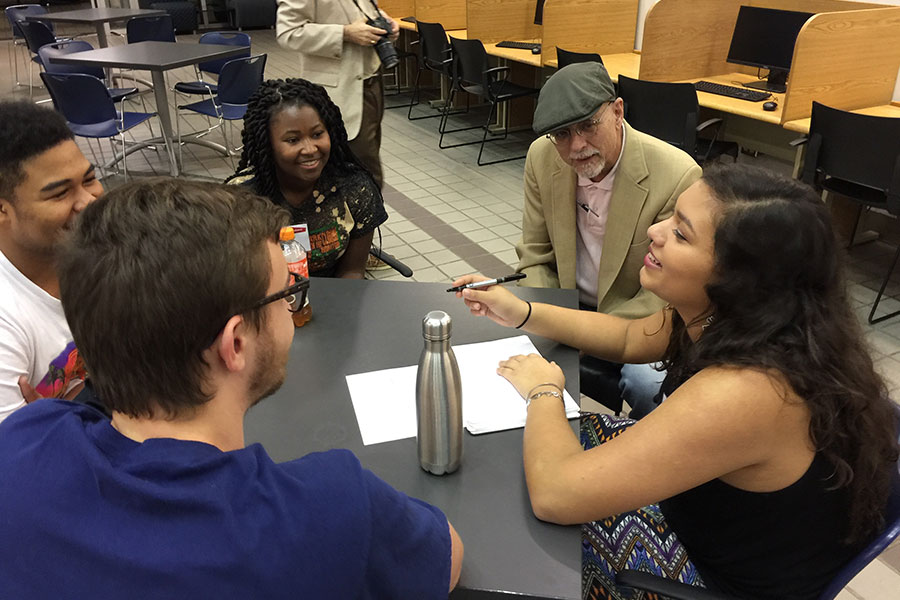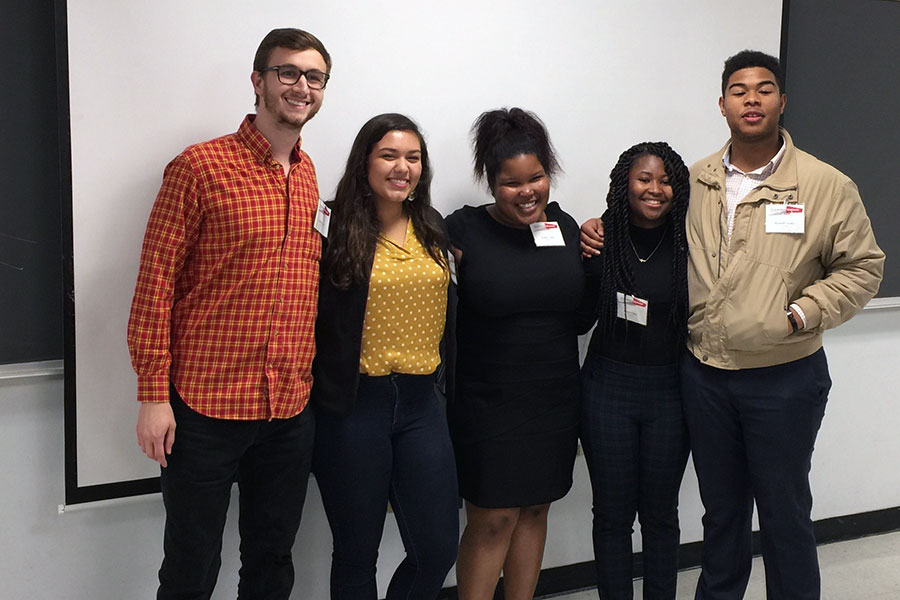
Every day, a question is heard in households across the country. “Honey, where are the car keys?” Or maybe, “Have you seen my glasses?” Or perhaps the treacherous, “OK, what did you do with the remote?” Yes, people lose things. Can anything be done about it?
That was just one of the problems pursued by Florida State University and Florida A&M University students during InnoVenture Weekend, a two-day team-building, innovation and business-pitch competition earlier this month.
How to find lost items and other problems facing older adults were drawn from more than 80 submissions by volunteers with the Institute for Successful Longevity (ISL), and the solutions came from 16 hours of intense creative, collaborative work by students of engineering, computer science, business and entrepreneurship.
“It was wonderful to see the energy and excited interactions between the students and the mentors from the Institute for Successful Longevity,” said Wendy Plant, director of the Center for Student Engagement and Entrepreneur in Residence in the Jim Moran School of Entrepreneurship. “The students were very engaged by listening to the mentors and understanding the needs and problems that they presented. I was impressed by the interest and respect shown by both groups toward the other.”
To get students started, Neil Charness, director of the Institute for Successful Longevity presented an overview of the demographics of older Americans, and Ken Baldauf, director of FSU’s Innovation Hub, gave the students a quick tour through the elements of human-centered design.
And because innovators need not only create a design but also draw the interest of investors, Plant laid out the key steps in making an effective pitch.
The 23 students split up into five teams and began the challenge by talking with older adults who serve as mentors with the Institute for Successful Longevity about real-life problems to get an understanding of how something small — keeping track of keys, lifting heavy items out of a car, remembering daily tasks, taking medicines — can become frustrating challenges in an older person’s life.
Full of information and ideas, the students set to work and, hours later, presented their designs and made their pitches before the panel of judges.
The winning design, determined by a panel of judges, was Findr, an innovative product to track down lost eyeglasses, car keys, TV remotes and other items often misplaced in the home — without using the internet.
Students on the Findr team say the process of seeking a design and creating a pitch was a learning experience. The winning team members were: Jessica Bachansingh (junior, retail entrepreneurship), Kade Aley (graduate student, mechanical engineering), Kayla Oden (sophomore, industrial engineering), Russell Cooks (sophomore, computer engineering) and Taylor Coffey (sophomore, civil engineering).

“As a retail entrepreneurship student, I found InnoVenture Weekend to be a great opportunity to interact with students of completely different majors,” Bachansingh said. “My team members were all engineers, and so it was amazing to connect in a shared, competitive space.”
Oden said it was amazing to experience what happens when a diverse group of people come together and work toward a common goal.
“I feel as though my team respected one another’s opinions, fed off of each other’s creative ideas and blended our strengths to create an amazing idea and presentation,” Oden said. “InnoVenture encouraged me to think critically, communicate clearly and also to take risks.”
And what about Findr? Would it work?
“Findr is a viable product because our customers range from younger to older adults, with a focus on the elderly,” Bachansingh said. “I myself would purchase Findr — and I’m only 21 — because I always lose my wallet. Having Findr would give me more peace of mind.”
Aley agreed.
“It fits the niche of finding lost items without being interconnected to the Internet/cellular connection,” Aley said.
In addition to Findr, the designs were:
- Mova, which helps those in wheelchairs sustain their mobility. Team members were Ana Sanchez (senior, entrepreneurship), Ruben Nelson (graduate student, electrical engineering), Ericka Gutierrez (junior, industrial engineering), Marcus Stanton (sophomore, chemical engineering), and Keishon Smith (senior, electrical and computer engineering).
- Smart Cart, which helps individuals move heavy items, such as groceries, from their car to their home — or around the house or yard. Team members were Dwayne Pinder (sophomore, mechanical engineering), Reza Seyedimarghaki (graduate student, mechanical and civil engineering), Cameron Hall (sophomore, mechanical engineering) and Maria Cucalon (senior, marketing and management).
- Medi-Mug, which dispenses various medicines in an ingenious way. Team members were Hayley McAleese (junior, retail entrepreneurship), Chidiebere Otuonye (sophomore, computer engineering), Zhe Liu (graduate student, industrial manufacturing engineering) and Jalen Munoz (sophomore, computer engineering).
- yAAD, which helps older adults keep track of daily tasks. Team members were Rohit Ganesh Sonavane (graduate student, electrical and computer Engineering), Alejandra Cavero (junior, marketing and management information systems), Jerl Wodford (sophomore, computer engineering) and Mauricio Espinoza (junior, computer science).
The teams with the winning designs — Findr, followed by Mova and Medi-Mug, which tied for second place — each received a cash prize.
The enthusiasm of the InnoVenture Weekend teams was telling, said Mike Devine, entrepreneur in residence and professor in the FAMU-FSU College of Engineering.
“Today’s students want to tackle challenges that have a global impact, and I think the work of the teams and the quality of their designs represent that determination,” he said. “Students already gain a comprehensive education in their chosen discipline as undergraduates, but they also need a mindset and skill set to turn their ideas into practical solutions for real-world problems. We established InnoVenture Weekend to give them an opportunity to deal with the challenges people face every day, and the students’ work far exceeded my expectations.”
Charness said he was impressed with how well students and older adults worked together.
“It was a wonderful example of an intergenerational design process,” he said. “Having such bright, eager students working hand-in-hand with senior mentors resulted in truly creative designs.”
The mentors appreciated the collaborative process as well.
“My team was wonderful,” said Suzette Williams, one of the mentor volunteers. “They put together in 16 hours a practical and innovative solution to an ongoing and aggravating problem I face almost daily. Their challenge was complicated. They didn’t even flinch!”
As for Findr, the winning design, Devine described it as an excellent example of students putting their education and creativity to work.
“Findr is simple, uses existing technology in a new and different way, and it likely could be manufactured at a low cost,” he said. “I wish we could tell you how Findr works, but we don’t want to give away any secrets. The students may want to take the Findr concept to market.”




